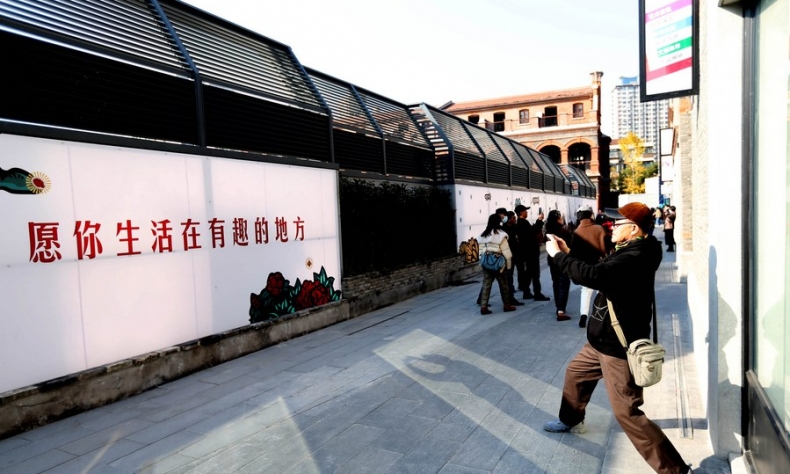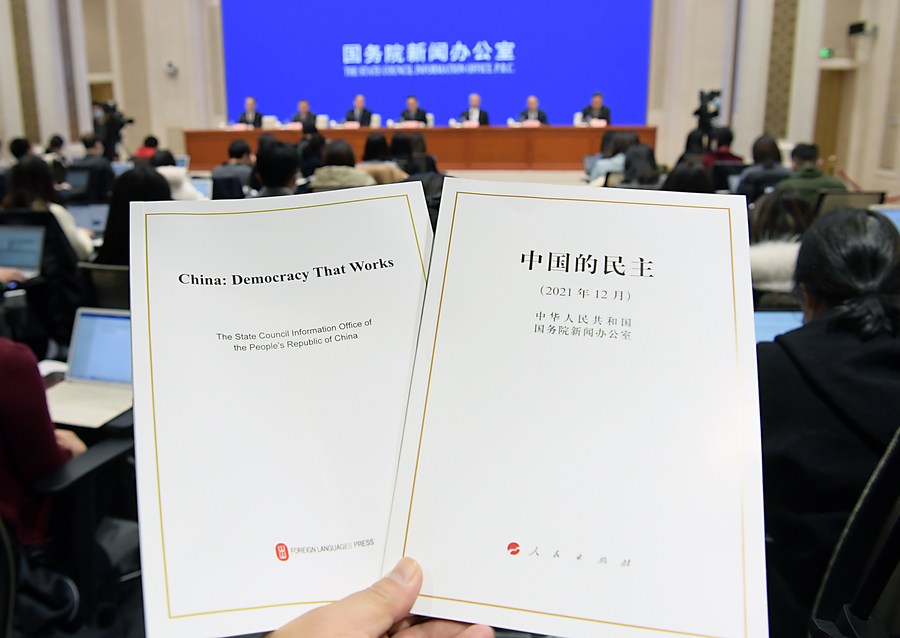True Democracy Should Work

Democracy is not an adornment or publicity stunt; rather, it is meant to be used to solve problems faced by the people.
As the U.S. organized “Summit for Democracy” further polarizes an already divided world, democracy has become a buzzword eliciting heated debate. A term derived from ancient Greek, democracy means “rule by the people” or “sovereignty of the people.” Getting at its true essence, Chinese President Xi Jinping pointed out, “Whether a country is a democracy or not depends on whether its people are really the masters of the country,” when addressing a central conference on work related to people’s congresses in October 2021. As an embodiment of the political advancement of human society, democracy has evolved and been practiced for thousands of years and is still evolving with no universal yard stick agreed upon internationally.
However, solely obsessed with one form of democracy — “competitive election,” — the U.S. has been misappropriating and weaponizing democracy for its geopolitical gain by convening a summit for democracy. Arbitrarily designating who is a democratic country and who is not based on its own criterion runs counter to the spirit of democracy and rides roughshod over international norms. At the October conference, Xi highlighted, “Democracy is a common value shared by all humanity. It is a right for all nations, not a prerogative reserved for a few. Democracy takes different forms, and there is no one-size-fits-all model. It would be totally undemocratic to measure the diverse political systems in the world with a single yardstick or examine different political civilizations from a single perspective.” Xi incisively observed that if the people are engaged only at the time of voting but go dormant soon after, if they listen to slogans at the time of the election but have no say after the election, or if they are favored at the time of canvassing but are left out in the cold after the election, such a democracy is not a true democracy. As for how to evaluate a country’s level of democracy and the efficiency of its political system, China proposed its suggestion, which is to observe whether the succession of its leaders is orderly and in line with the law, whether all the people can manage state and social affairs and economic and cultural undertakings in conformity with legal provisions, whether the public can express their requirements without hindrance, whether all sectors can efficiently participate in the country’s political affairs, whether national decision-making can be conducted in a rational and democratic way, whether people of high caliber in all fields can be part of the national leadership and administrative systems through fair competition, whether the governing party is in charge of state affairs in accordance with the Constitution and the law, and whether the exercise of power can be kept under effective restraint and supervision. Xi emphasized this point of view at the October conference.

China’s State Information Office recently released the White Paper China: Democracy That Works elaborating China’s whole-process people’s democracy, which integrates process-oriented democracy with results-oriented democracy, procedural democracy with substantive democracy, direct democracy with indirect democracy, and people’s democracy with the will of the state. It is a model of socialist democracy that covers all aspects of the democratic process and all sectors of society. It is a true democracy that works. A recent South China Morning Post opinion piece noted, “China has demonstrated that a nation does not need to meet the West’s definition of ‘democracy’ to achieve success for its people.”
According to President Xi, democracy is not an adornment or publicity stunt; rather, it is meant to be used to solve problems faced by the people. To judge whether a country is democratic, it is important to see whether its people run their own country. In addition to voting rights, it is important to see whether people have the rights to extensive participation. China’s system of people’s congresses ensures that all power in the country belongs to the people, and that the country is run by the people to the fullest extent. As of April 2021, the national legislature (National People’s Congress) has publicly solicited opinions on draft laws on 230 occasions. In recent years, with the setup of local legislative outreach offices by the Commission of Legislative Affairs of the National People’s Congress Standing Committee, a direct channel for grassroots opinions to reach the highest legislature of the country has been formed. According to a report by New China Research, as of October 2021, 22 outreach offices nationwide had collected more than 7,800 opinions and suggestions for 126 draft laws and annual legislative plans, over 2,200 of which were absorbed and adopted to varying degrees.
British political commentator Carlos Martinez indicated in a recent interview with Xinhua that although Western media and politicians tend to label China as being “undemocratic,” whereas in reality, China’s system of whole-process democracy is far more “meaningfully democratic” than the so-called liberal democracy in the West.

While having successfully eliminated absolute poverty, China has seen its per capital GDP exceed US $10,000. Meanwhile, it also boasts the world’s largest social security system with basic health insurance and basic old-age insurance covering almost every Chinese. A survey based on interviews with nearly 20,000 Chinese citizens published by the Washington Post in May 2021, Chinese people’s trust in their government reached 98 percent. At the same time, Americans have become increasingly pessimistic about U.S. politics and the state of its democracy. According to a poll by The Associated Press-NORC Center for Public Affairs Research, only 16 percent of Americans regard democracy as working well or extremely well; 45 percent think democracy isn’t functioning properly. A Pew Research Center survey finds that only 20 percent of Americans trust the federal government always or most of the time.
As President Xi indicated during a recent virtual meeting with Russian President Vladimir Putin, whether a country is democratic or not and how to better realize democracy can only be left to its own people to decide.
Meanwhile, democracy in international relations is also urgently needed. As Xi recently emphasized, international affairs should be managed by all countries through consultation. He pointed out that promoting greater democracy in international relations and upholding true multilateralism is the expectation of the people and the prevailing trend of the times.
 Facebook
Facebook
 Twitter
Twitter
 Linkedin
Linkedin
 Google +
Google +










